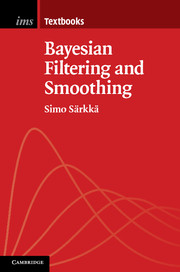Book contents
- Frontmatter
- Contents
- Preface
- Symbols and abbreviations
- 1 What are Bayesian filtering and smoothing?
- 2 Bayesian inference
- 3 Batch and recursive Bayesian estimation
- 4 Bayesian filtering equations and exact solutions
- 5 Extended and unscented Kalman filtering
- 6 General Gaussion filtering
- 7 Particle filtering
- 8 Bayesian smoothing equations and exact solutions
- 9 Extended and unscented smoothing
- 10 General Gaussian smoothing
- 11 Particle smoothing
- 12 Parameter estimation
- 13 Epilogue
- Appendix Additional material
- References
- Index
Preface
Published online by Cambridge University Press: 05 June 2014
- Frontmatter
- Contents
- Preface
- Symbols and abbreviations
- 1 What are Bayesian filtering and smoothing?
- 2 Bayesian inference
- 3 Batch and recursive Bayesian estimation
- 4 Bayesian filtering equations and exact solutions
- 5 Extended and unscented Kalman filtering
- 6 General Gaussion filtering
- 7 Particle filtering
- 8 Bayesian smoothing equations and exact solutions
- 9 Extended and unscented smoothing
- 10 General Gaussian smoothing
- 11 Particle smoothing
- 12 Parameter estimation
- 13 Epilogue
- Appendix Additional material
- References
- Index
Summary
The aim of this book is to give a concise introduction to non-linear Kalman filtering and smoothing, particle filtering and smoothing, and to the related parameter estimation methods. Although the book is intended to be an introduction, the mathematical ideas behind all the methods are carefully explained, and a mathematically inclined reader can get quite a deep understanding of the methods by reading the book. The book is purposely kept short for quick reading.
The book is mainly intended for advanced undergraduate and graduate students in applied mathematics and computer science. However, the book is suitable also for researchers and practitioners (engineers) who need a concise introduction to the topic on a level that enables them to implement or use the methods. The assumed background is linear algebra, vector calculus, Bayesian inference, and MATLAB® programming skills.
As implied by the title, the mathematical treatment of the models and algorithms in this book is Bayesian, which means that all the results are treated as being approximations to certain probability distributions or their parameters. Probability distributions are used both to represent uncertainties in the models and for modeling the physical randomness. The theories of non-linear filtering, smoothing, and parameter estimation are formulated in terms of Bayesian inference, and both the classical and recent algorithms are derived using the same Bayesian notation and formalism. This Bayesian approach to the topic is far from new. It was pioneered by Stratonovich in the 1950s and 1960s – even before Kalman's seminal article in 1960.
Information
- Type
- Chapter
- Information
- Bayesian Filtering and Smoothing , pp. ix - xiiPublisher: Cambridge University PressPrint publication year: 2013
